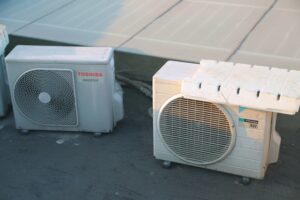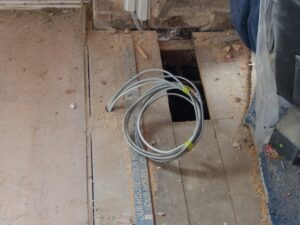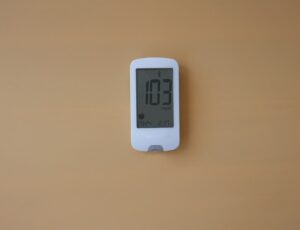Have you ever wished your HVAC system could just “know” what you need?
Well, with smart HVAC technology, it almost can!
Imagine controlling your home’s temperature with just a tap on your phone or a voice command. Whether it’s a hot summer day or a chilly winter evening, your system adjusts itself based on your schedule, ensuring comfort without the extra energy cost.
But how do you find the best system for your needs?
That’s where Excel Mechanical comes in.
Our team is dedicated to providing high-quality, customized HVAC solutions for homes and businesses. Whether you’re looking for a system that optimizes energy usage or one that fits your specific space requirements, we’ve got you covered. You can trust us to get the job done right—efficiently and affordably.
We focus on blending top-notch service with the latest technology. From installation to maintenance, we offer everything you need for comfort and peace of mind.
In this blog, we’ll explore:
- How smart HVAC systems improve your home’s energy efficiency.
- Key components of smart HVAC systems.
- How to choose the right system for your needs.
Let’s get started!
Fundamentals of Smart HVAC Technology
Smart HVAC technology offers a more efficient, convenient, and flexible way to regulate home temperature. It uses advanced systems and components to optimize performance and energy use.
What Is Smart HVAC?
A smart HVAC system uses technology to help control heating, ventilation, and air conditioning more effectively. Unlike traditional systems, smart HVAC allows you to set schedules, adjust settings remotely, and receive alerts through your devices. This gives you more control and saves energy.
Smart sensors and Wi-Fi connectivity make adapting to your needs and preferences easier. This can mean better comfort and lower energy bills. You can even use your smartphone or a digital assistant to adjust the temperature while away from home.
Components of a Smart HVAC System
A smart HVAC system comprises several key components.
- Smart Thermostats are central to this setup. They adjust according to your schedule and learn your habits.
- Sensors detect changes in temperature, humidity, and occupancy. They send this information to the thermostat to make adjustments.
- Connected Devices like smartphones or tablets allow you to control the system from anywhere.
- Zoning Systems let you heat or cool different parts of your home separately. This increases comfort and efficiency.
All these components work together to create a responsive system tailored to your needs.
How Smart HVAC Systems Improve Efficiency
Smart HVAC systems improve efficiency by optimizing energy use.
They adapt to your schedule and the weather, reducing waste. Using sensors, they maintain a comfortable climate while using less power. This means lower utility bills and less environmental impact.
Our systems integrate with other smart home devices to ensure smooth, reliable operation. Our expertise in HVAC and plumbing services means you receive systems designed to meet your needs and budget.
With Excel Mechanical, you choose quality and value for residential and commercial needs, ensuring exceptional results.
Advantages of Smart HVAC Systems in Modern Homes
Smart HVAC systems bring significant benefits to modern homes. They offer notable energy savings, improved comfort through precise controls, enhanced air quality, and long-term cost benefits, making them a wise choice for homeowners seeking efficiency and comfort.
Energy Savings
Smart HVAC systems use sensors and automation to optimize energy use.
They adjust heating and cooling based on room occupancy and time of day. Programmable thermostats allow you to set schedules, reducing energy waste when you’re away.
This system significantly reduces utility bills. You can control settings remotely through your smartphone, helping you manage energy use wherever you are. Our team ensures these systems are customized for your needs, offering energy-efficient solutions that align with your budget.
Enhanced Comfort Controls
These systems offer advanced comfort with precise temperature adjustments.
You can create different zones in your home, each with its own setting. This means each room can maintain a comfortable temperature independently.
Control is at your fingertips. Use your phone or smart device to change the heat or air conditioning, ensuring personal comfort anytime.
Air Quality Improvement
Smart HVAC systems monitor and improve indoor air quality.
They detect humidity and allergens and adjust settings to keep the air clean and comfortable. This is vital for homes dealing with humidity or dust issues.
Specialized filters and airflow controls reduce pollutants and maintain optimal humidity levels. This makes breathing easier and healthier for everyone, especially those with allergies.
Smart technology in your HVAC ensures a fresh and pleasant atmosphere in your home.
Long-Term Cost Benefits
While the initial investment in smart HVAC might seem high, the long-term savings are worth it.
Reduced energy use leads to lower monthly bills. The system’s predictive maintenance alerts you to issues before they escalate, cutting repair costs.
With longer-lasting equipment, the need for replacements is minimized. Excel Mechanical offers solutions that meet your financial needs while providing quality and value, handling residential and commercial installations with utmost professionalism.
Smart HVAC System Features
Smart HVAC systems offer innovative features that enhance home comfort and efficiency. Key elements include remote monitoring, automated scheduling, geofencing, and predictive maintenance.
Remote Monitoring and Control
Smart HVAC systems let you monitor and control your home’s climate from anywhere.
Use a smartphone app to adjust settings, check system status, and receive alerts. This flexibility ensures your home is always comfortable, even if your schedule changes unexpectedly.
Some systems include energy usage reports, which help you make informed decisions to save on costs. Adjusting temperatures remotely can lead to significant savings.
Automated Scheduling
Automated scheduling optimizes energy use by adjusting settings based on your routine.
For example, you can program your system to lower heating or cooling during work hours and ramp up right before you return home. This ensures efficiency without sacrificing comfort.
You can change the setting manually or through your smart device if your schedule varies. Automated scheduling helps reduce energy waste, often resulting in lower utility bills.
Geofencing Technology
Geofencing technology uses your smartphone’s location to adjust HVAC settings automatically.
Your system will reduce energy use as you leave home and restore your preferred settings when you return. This seamless adjustment enhances comfort and efficiency.
No need to manually adjust settings each time you come and go. Geofencing is particularly useful if your routine varies.
Predictive Maintenance
Predictive maintenance helps prevent costly breakdowns by monitoring system performance and detecting early signs of failure. Sensors and software analyze data to alert you when your system needs attention. This proactive approach can extend the life of your HVAC system.
Timely maintenance helps maintain efficiency and keeps energy costs in check. Our offerings include predictive maintenance features, ensuring your system remains in peak condition.
Enjoy peace of mind along with enhanced reliability and performance.
Integration with Home Automation
Smart HVAC systems extend convenience and efficiency by syncing with home automation systems. They offer seamless interaction with smart thermostats, compatibility with a range of smart home devices, and integrated voice control capabilities for ease of use.
Working with Smart Thermostats
Smart thermostats play a crucial role in smart HVAC systems.
They allow you to control your home’s temperature from anywhere. With easy-to-use apps, you can adjust settings remotely. They learn from your habits and adjust themselves, optimizing energy use and keeping your home at the perfect temperature.
Compatibility with Smart Home Devices
Your smart HVAC system should work with various smart home devices.
This means connecting smoothly with systems like lighting, security, and more. Compatibility ensures seamless communication and increases overall efficiency.
You can set your devices to work together for customized home environments. Our team excels in offering solutions that effortlessly integrate all your devices, ensuring you have a system that matches your needs and budget.
Voice Control Capabilities
Control your HVAC system using simple voice commands.
Smart systems are compatible with popular voice assistants like Alexa or Google Assistant, making it easy to adjust the temperature without lifting a finger.
Voice control offers an intuitive way to manage your home environment. It responds instantly to your commands. Choosing solutions that embrace voice technology enhances your living space simply and effectively.
Choosing the Right Smart HVAC System
Choosing a smart HVAC system involves evaluating your home’s size and layout, system performance metrics, and cost versus value to find the best options. You want to ensure your chosen system fits your needs and budget.
Assessing Home Size and Layout
The size and layout of your home play a big role in choosing the right system.
Small homes might only need a single smart thermostat, while larger homes might require multiple zones for temperature control. Think about open spaces versus separate rooms and how air might flow differently.
Smart HVAC systems can be customized with zone control, allowing you to set different temperatures in different rooms. This can save energy by not heating or cooling areas that aren’t in use.
Matching the system capacity with your home’s needs is essential to avoid energy waste or insufficient heating and cooling.
Evaluating System Performance Metrics
Efficiency is key.
Look for systems with high SEER (Seasonal Energy Efficiency Ratio) ratings for cooling and HSPF (Heating Seasonal Performance Factor) for heating. Higher numbers mean more energy efficiency.
Programmable features allow you to set temperatures for specific times, adding convenience and reducing energy bills.
Consider systems with smart sensors that can adjust settings based on occupancy and weather conditions. This can optimize performance and comfort.
Make sure you choose a system that integrates well with your existing smart home devices for a seamless experience.
Understanding Cost vs. Value
Balance your spending with the benefits you get.
Initial costs can be high, but savings from reduced energy use can pay off over time. Look for warranties and maintenance plans that offer peace of mind and long-term savings.
We offer top-notch HVAC systems that fit any budget. We provide systems tailored to your needs, ensuring you don’t overspend while getting high-quality performance and value.
Our team is committed to quality installation and service, helping you make a smart investment in your home.
Installation and Setup
Installing smart HVAC systems can seem challenging, especially when deciding between professional installation and DIY. It’s also important to know the necessary steps for setting up your system to ensure it runs smoothly and efficiently.
Professional Installation vs. DIY
Choosing between a professional installation and a DIY approach depends on your comfort level and skills.
Professional installers, like Excel Mechanical, offer expertise and ensure your system fits your home’s requirements precisely. We understand both residential and commercial needs, providing quality and value. This option often means faster setup with fewer errors.
For those with skills in home improvement, DIY installation can save money. It’s crucial to know your system’s specifics, follow the manual closely, and have the right tools. However, errors during a DIY installation could lead to efficiency issues or void warranties.
The complexity of connections and settings, especially with smart systems, makes professional installation a secure choice.
The Setup Process Explained
The setup process varies by system but generally includes a few key steps.
- First, place the smart thermostat and sensors in appropriate locations. Ensure they are in areas that accurately reflect temperature changes. Follow the manual to connect the thermostat to your HVAC system’s wiring.
- Next, establish a Wi-Fi connection and download the necessary app to your smartphone. This app lets you control temperatures and settings remotely, offering convenience and energy savings.
- Configuring the system to your preferences is simple. Use the app to set desired temperatures and schedules and explore different modes, like eco or comfort, for optimized energy use.
Maintenance and Upkeep
Ensuring your smart HVAC system functions efficiently requires regular maintenance and quick responses to issues. Proper upkeep not only extends the lifespan of your system but also saves energy and money.
Routine Maintenance Guidelines
Regular maintenance is essential for keeping your HVAC system running smoothly.
Change air filters every 1-3 months, as clogged filters can strain the system and reduce efficiency. Inspect and clean the outdoor unit regularly to prevent debris buildup that can block airflow.
Schedule annual check-ups with a professional to identify potential issues early. Our skilled technicians provide thorough inspections, ensuring everything from the thermostat to the heat exchanger is in good condition.
Keep your system’s software updated for optimal performance. Smart HVAC systems often receive software updates that improve functionality and efficiency.
Troubleshooting Common Issues
Despite regular maintenance, problems may still arise.
- Common issues include incorrect thermostat settings or blocked vents. Always check that your thermostat is set to the correct mode (heat or cool) and that vents are open.
- If your units aren’t responding, it might be due to electrical issues or sensor errors. Resetting the system or checking the power source can sometimes resolve minor glitches.
- For persistent problems, consulting professionals is crucial. We provide expert diagnosis and repair services, tailored to your needs and budget. Our commitment to quality and value sets us apart as leaders in the HVAC and plumbing industry.
Future Trends in Smart HVAC Technology
Now, let’s examine some of the future trends in smart HVAC technology.
- Smart Sensors and Data Analytics: In the future, smart HVAC systems will use advanced sensors to monitor indoor and outdoor conditions. These sensors will collect data to optimize temperature, humidity, and energy use. By analyzing this data, systems can learn and adjust to your habits, offering more personalized comfort.
- Integration with IoT: Smart HVAC systems will seamlessly connect with other smart home devices through IoT (Internet of Things). This means your HVAC system could work with your smart lights or security system to create an enhanced, cohesive living environment. Automated routines will manage energy use efficiently, saving you money.
- Green Technology: Expect to see more environmentally friendly HVAC options. Technologies like geothermal heat pumps and solar-powered systems will become more common. These green solutions aim to reduce carbon footprints and improve energy efficiency, making them a smart choice for eco-conscious homeowners.
- Voice and App Control: Controlling your HVAC system with voice commands or a smartphone app will become standard. These systems will offer intuitive apps for managing temperature settings and monitoring energy use from anywhere. This feature makes it easy to maintain a comfortable home environment effortlessly.
Environmental Impact and Sustainability Considerations
Smart HVAC technology can have a positive effect on the environment. These systems use energy more efficiently, decreasing your home’s carbon footprint. By only heating or cooling when needed, smart HVAC systems can significantly cut down on energy usage.
With features like programmable thermostats, you can set your system to run less when you’re away. This reduces the demand on power plants, leading to lower greenhouse gas emissions. Motion sensors can also adjust temperatures when rooms are empty, saving even more energy.
Using eco-friendly refrigerants is another way these systems minimize harm. Traditional refrigerants can be harmful to the ozone layer. Newer options in smart HVACs are less damaging, contributing to a healthier planet.
Investing in smart technology shows your commitment to sustainability. It not only helps the environment but also saves on energy bills. You can feel good about taking steps that are beneficial both financially and ecologically.
Choosing smart HVAC technology is a step toward a greener home. These systems help balance comfort with sustainability, making them an ideal choice for modern living.
Frequently Asked Questions
When it comes to upgrading your home’s comfort, making the right choice for your HVAC system can feel overwhelming, especially with all the new tech options available. But don’t worry! We’ve got you covered with answers to some common questions.
What is the newest technology for HVAC systems?
Smart HVAC systems now include Wi-Fi connectivity, remote control through apps, and learning algorithms that adapt to your schedule. Some even integrate with smart home assistants for voice control.
How much does a smart HVAC system cost?
The cost can vary based on features and the size of your home. Generally, prices range from a few hundred to a few thousand dollars. It’s an investment that can lead to energy savings.
What are the key benefits of installing a smart HVAC system?
Smart HVAC systems offer convenience, comfort, and energy savings. You can control the temperature remotely and enjoy personalized settings. They often reduce energy usage, lowering your utility bills.
What should homeowners look for when choosing a smart HVAC system?
When choosing a system, consider compatibility with your current setup, ease of use, and energy-saving features. Make sure it matches your home’s size and specific needs.
How do smart HVAC systems contribute to energy efficiency?
These systems adjust heating and cooling based on your needs and habits, using less energy when possible. They help to maintain a consistent temperature, which can prevent energy waste.
What is the future of HVAC technology?
The future of HVAC systems includes more advanced automation, integration with smart grids, and even more efficient energy use. At Excel Mechanical, we pride ourselves on delivering exceptional HVAC solutions for every need, ensuring you receive the best service and value.




